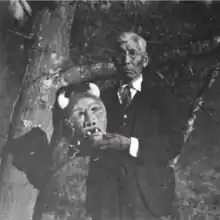Will West Long | |
|---|---|
 Long c. 1925 | |
| Born | Wili Westi c. 1869 Big Cove, North Carolina, U.S. |
| Died | March 14, 1947 (aged 78) |
| Nationality | Eastern Band Cherokee, American |
| Education | |
| Known for | Cherokee cultural historian, mask maker |
Will West Long (c. 1869–1947; née Wili Westi)[1] was a Cherokee mask maker, translator, and Cherokee cultural historian.[2][3] He was part of the Eastern Band of Cherokee Indians (Cherokee: ᏣᎳᎩᏱ ᏕᏣᏓᏂᎸᎩ, Tsalagiyi Detsadanilvgi). Long was one of the people responsible for carrying on the legacy of Cherokee cultural traditions into the 20th-century, including traditional Cherokee dance.[4] Long was instrumental in establishing the Cherokee Fall Festival (or Cherokee Indian Fair).[5]
Early life and education
Wili Westi was born in c. 1869 in Big Cove, North Carolina.[2] His parents were Sally Terrapin (or Ayasta), a medicine woman and John Long, a Baptist preacher.[2] He was raised with traditional Cherokee spiritual values despite his father being a Baptist.[3]
Long was sent to Trinity College (now Duke University) when he was age 16.[2][3] After several months he ran away from the college and walked home; he remained home for a short time before going back to the college for a year.[3] He never learned how to read or write in the Cherokee language as a child, only speak.[3] An older college classmate from Tennessee taught him Cherokee literacy.[3]
When he returned home from college he initially settled into farming.[3] In 1887, ethnographer James Mooney hired Long to be his scribe and interpreter.[3] Mooney encouraged Long to go back to school, as a result he attended Hampton Institute (now Hampton University) from 1895 to 1904.[3][6]
Career
For 10 years he lived and worked in New England, including in the towns and cities of Conway, Amherst, North Amherst, and Boston.[3][6]
His health started to decline and his mother was getting older, around 1904 he returned to live on the Qualla.[3] Upon his return he started a project making a systematic study of Cherokee tradition, which included the study of medicine, ritual, and "supernatural lore".[3] Long started to work closely with Mooney again, as both men shared the goal of wanting to preserve Cherokee history.[3] Other ethnologists and anthropologists came to work with Long including Mark R. Harrington, Frank G. Speck, William Henry Gilbert, Paul Kirchhoff, Arthur Randolph Kelly, Frans M. Olbrechts, and Leonard Broom.[3]
He created traditional Cherokee masks for cultural use, a craft he learned from a cousin, Charley Lossiah.[6]
As he got older, Long witnessed the Cherokee peoples dependence on the outside world and their economy.[3] He started to share with the Cherokee the idea of the world ending (but it was outside of the Christian-meaning of Armageddon).[3] James Mooney and Frans M. Olbrechts' "Swimmer Manuscript" was a published false statement that was damaging to Long's reputation because Olbrecht could not understand the difficulties Long faced in the acculturation process.[3]
His son, Allen Long (1917–1983) was also a noted Cherokee mask maker.[7] His nephew, Walker Calhoun (1918–2012) was a Cherokee medicine man, musician, dancer, and teacher.
Death and legacy
At the time of his death, Long was translating and interpreting a series of books with anthropologist Frank G. Speck, and writing a Cherokee dictionary with George Myers Stephens.[3] Long died of a heart attack on March 14, 1947, at the Qualla.[3]
Long's masks can be found in museum collections include at the National Museum of the American Indian,[8] and the Museum of the Cherokee Indian.[9] The Will West Long manuscript papers are kept at the Gilcrease Museum.[10] Many of Long's original writings are in the Frank Speck Cherokee Collection at the American Philosophical Society.[5]
In 2020, the Museum of the Cherokee Indian in Cherokee, North Carolina held a group exhibition of Cherokee masks called "Many Faces", which included Booger masks by Long.[11]
Publications
- Speck, Frank G.; Broom, Leonard (1993). Cherokee Dance and Drama. The Civilization of the American Indian Series. Vol. 163. Will West Long (contributions). University of Oklahoma Press. ISBN 978-0-8061-2580-0.
See also
References
- ↑ "LC Name Authority File (LCNAF), West Long, Will". The Library of Congress.
- 1 2 3 4 "Will West Long (1870 - 1947)". Cherokee Traditions, Hunter Library Digital Initiatives at Western Carolina University. Retrieved 2022-06-30.
- 1 2 3 4 5 6 7 8 9 10 11 12 13 14 15 16 17 18 19 Witthoft, John (April 1948). "Will West Long, Cherokee Informant". American Anthropologist. 50 (2): 355–359. doi:10.1525/aa.1948.50.2.02a00250. JSTOR 664194.
- ↑ Williams, Michael Ann (September 1995). Great Smoky Mountains Folklife. University Press of Mississippi. pp. 33–34. ISBN 978-0-87805-792-4.
- 1 2 "People: Will West Long (1870 – 1947)". Cherokee Traditions, Hunter Library Digital Initiatives at Western Carolina University. Retrieved 2022-07-18.
- 1 2 3 Ellison, George. "Cherokee masks come in many guises". Smoky Mountain News. Retrieved 2022-07-19.
- ↑ "People: Allen Long (1917 – 1983)". Cherokee Traditions, Hunter Library Digital Initiatives at Western Carolina University. Retrieved 2022-07-18.
- ↑ "Mask". National Museum of the American Indian. Retrieved 2022-07-19.
- ↑ "2007.20 - Mask". Museum of the Cherokee Indian. Retrieved 2022-07-19.
- ↑ "Manuscript Collection: Will West Long". Gilcrease Museum. Retrieved 2022-07-18.
- ↑ McKie, Scott (2020-06-08). ""Many Faces" mask exhibit opens at Museum of the Cherokee Indian". Cherokee One Feather. Retrieved 2022-07-19.
Further reading
- Mooney, James (1932). Olbrechts, Frans M. (ed.). The Swimmer Manuscript: Cherokee Sacred Formulas and Medicinal Prescriptions. Bulletin, Smithsonian Institution Bureau of American Ethnology. Vol. 99. Smithsonian Institution Bureau of American Ethnology. U.S. Government Printing Office. ISSN 0082-8882.
External links
- Audio clip: Cherokee Indian dance tunes, performed by Long in 1946, American Folklife Center, Library of Congress